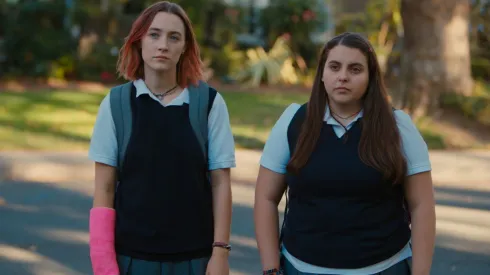The 2017 release of Greta Gerwig‘s “Lady Bird” marked a significant inflection point in contemporary American independent cinema. Achieving both critical consensus—culminating in five Academy Award nominations—and substantial box office success, the film conclusively demonstrated the powerful commercial and artistic viability of narratives centered entirely on the intricate interior lives of women.
The resulting body of work showcases a rich spectrum of directorial and screenwriting voices, all operating within the framework that Saoirse Ronan‘s movie helped solidify: that an intimate, specific focus on the female perspective can yield universally resonant and deeply compelling cinema. This selection highlights ten such essential titles that continue to define and enrich this pivotal era of filmmaking.
Nomadland (2020)
Chloé Zhao’s Best Picture winner is a quiet yet monumental portrait of Fern (Frances McDormand), a woman who, after losing her job and her community in the Great Recession, converts her van into a home and travels the American West as a modern-day nomad. Blending professional actors with real-life nomads, the film offers a meditative, often elegiac study on the search for community, the nature of home, and the fierce independence of older women living on the fringes of the modern economic system.
The Farewell (2019)
Based on a “real lie,” Lulu Wang’s delicate tragicomedy follows Billi, a Chinese-American woman who returns to China when her beloved grandmother, Nai Nai, is diagnosed with terminal cancer. The twist is that the entire family decides to withhold the diagnosis from Nai Nai, staging a wedding as an excuse to reunite. The film masterfully explores the cultural clash between Eastern and Western perspectives on family duty, grief, and the morality of a “good lie.”
Promising Young Woman (2020)
Emerald Fennell’s polarizing, neon-tinged thriller centers on Cassie (Carey Mulligan), a former medical student who has dropped out to live with her parents and dedicate her life to a singular, calculated mission of vengeance. She spends her evenings luring “nice guys” into compromising positions to expose their predatory nature. The film uses a subversive, genre-bending style to deliver a searing critique of patriarchal complicity, trauma, and the industry’s failure to hold powerful men accountable.
Eighth Grade (2018)
From writer-director Bo Burnham, this film is a piercing, almost uncomfortably authentic document of the final week of middle school for 13-year-old Kayla Day. It tracks her efforts to achieve social acceptance and conquer crippling anxiety, often channeled through self-help YouTube vlogs. Eighth Grade offers an essential and sensitive look at the pressures of the digital age, social media performance, and the poignant, often awkward relationship between a young woman and her well-meaning single father.
The Assistant (2019)
Kitty Green’s minimalist drama chronicles one ordinary day in the life of Jane (Julia Garner), a recently hired assistant to a powerful, unseen entertainment executive. Told with observational precision, the film exposes the grinding reality of microaggressions, institutional complicity, and the quiet acceptance of systemic abuse in the workplace. It is a taut, suffocating study of power dynamics, demonstrating how an environment of toxicity is maintained through small acts of silence and bureaucratic routine.
Never Rarely Sometimes Always (2020)
This sobering drama from Eliza Hittman follows Autumn, a 17-year-old in rural Pennsylvania, who discovers she is pregnant. Facing legal obstacles to obtaining an abortion without parental consent in her home state, she embarks on a necessary and arduous bus trip to New York City with her cousin, Skylar. The film is a raw, unromanticized depiction of female solidarity, reproductive rights, and the logistical and emotional burdens placed upon young women seeking essential healthcare.
The Lost Daughter (2021)
Maggie Gyllenhaal’s directorial debut, adapted from Elena Ferrante’s novel, centers on Leda, an academic on a seaside holiday who becomes intensely preoccupied with a beautiful young mother, Nina, and her daughter. This fascination triggers turbulent, long-suppressed memories of Leda’s own fraught experience as a young mother. The film is a mature, complex, and unblinking dissection of the ambivalence, exhaustion, and difficult sacrifices inherent in motherhood and the pursuit of a singular identity.
Clemency (2019)
Chinonye Chukwu’s emotionally devastating film is an intense character study of Bernadine Williams (Alfre Woodard), a veteran prison warden who oversees executions on the death row. After a recent procedure goes terribly wrong, the professional facade that shields her begins to crumble as she prepares for the execution of another inmate, Anthony Woods. The film focuses not on the politics of the death penalty, but on the profound emotional toll this work takes on the women tasked with administering it.
Shiva Baby (2020)
Emma Seligman’s debut is a masterclass in claustrophobic social comedy. Danielle, a young Jewish bisexual college student, is trapped at a shiva (a Jewish mourning gathering) with her hypercritical family. The high-stress event turns into a comedic horror show when her former girlfriend and, more problematically, her secret sugar daddy—along with his wife and crying baby—all show up. The film is a breathless, anxiety-ridden exploration of identity, expectation, and the messy intersection of one’s multiple lives.
Tully (2018)
Written by Diablo Cody and directed by Jason Reitman, this film is a raw, often surrealistic look at the deep exhaustion and psychological stress of modern motherhood. Marlo (Charlize Theron), a mother of three, is pushed to her breaking point after the birth of her third child. She reluctantly accepts a “night nanny,” Tully, who seemingly restores Marlo’s domestic sanity and spirit. The film offers a refreshingly complicated view on postpartum life and the desperate search for identity lost in the domestic routine.
